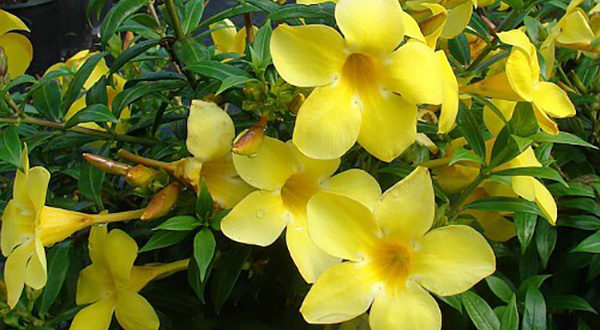Common Name: Allamanda
Scientific Name: Allamanda schottii/Allamanda schottii ‘Compacta’
Type of Plant: Shrub
Description: Vigorous and fast-growing, Allamanda schottii is an evergreen tropical shrub boasting a profusion of ravishing clusters of golden trumpet flowers, 2 in. across (5 cm), adorned with reddish-orange throat stripes. Blooming in succession for months throughout the summer to the first cold snap, the flowers give way to ornamental rounded, prickly fruits. The blossoms stand out against the handsome foliage of leathery green leaves, 2-4 in. long (5-10 cm), held in whorls along the stems.
Mature Size: 4-5′ tall x 4-5′ wide (Bush)/2-3′ tall x 2-3′ wide (Dwarf)
Blooms: Summer-Fall. Allamanda blooms on new growth. It does not tolerate cold and needs heat for adequate growth and flowering.
Fruit: No
Climate Requirements: A full sun or light shade lover, it is best grown in richly organic, fertile, moist, well-drained soils. Does not tolerate drought or wet soils. Allamanda appreciates heat on its vines, but its roots benefit from a cooler environment.
Care Requirements:
- Water and fertilize regularly during the growing season. Keep organic mulch around the base of a plant and fertilize twice each month.
- Prompt removal of spent flowers will encourage more blooms. Prune in late winter, early spring to encourage a more compact habit and a copious blooming.
- Generally pest and disease free. Keep an eye out for scale, mealy bugs and leaf spot. Allamanda drops its leaves when it suffers water stress. Yellowing between leaf veins, or chlorosis, indicates a need for more organic matter in the soil.
Spacing: Space plants 48-60″ apart
Water Needs: Average
Maintenance: Average
Special Uses/Attributes: Providing quick, long-season color, Allamanda makes a beautiful accent, hedge or single specimen. It will also happily reside in a
container to be moved indoors in cold weather. All the parts of the plant are toxic and the latex can cause dermatitises and allergic reactions to particularly sensible persons.
Florida Native: No

